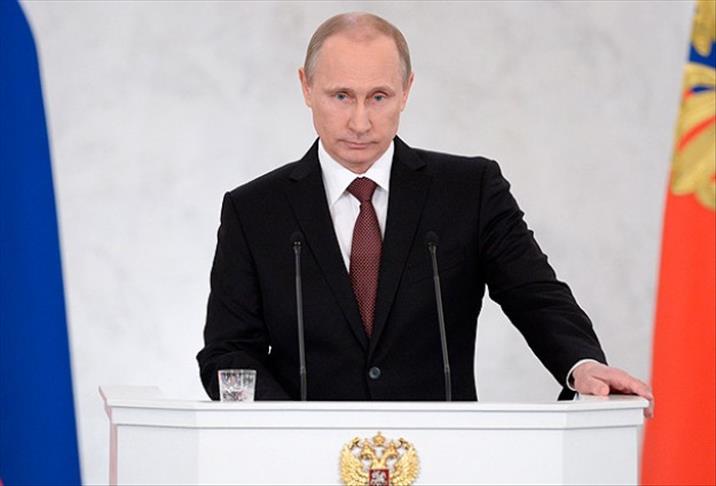Putin: Russia's national interests need respect
Russian President gives rousing speech to the Russian parliament declaring that Russia is not looking to annex anymore territories.

ANKARA
Russia's President Vladimir Putin has said Russia is not looking for more territories to annex after Crimea, adding "we have always respected the territorial integrity of Ukraine, unlike others who split Ukraine," in reference to the interim government there.
Noting that more than 90 percent of Russians support Crimea joining Russia, Putin said; "We are proposing cooperation with Ukraine."
The Russian president was frequently cut off by applause as he spoke to both houses of the upper house of the Russian parliament, the Duma, telling them that Crimea would remain an inseparable part of Russia.
"Don't believe in those who frighten you with Russia. We don't want Ukraine to be split, we don't have any need for it," Putin said.
Putin added that Russia's military presence in Crimea was in keeping with the country's existing agreements with Ukraine.
The peninsula's annexation follows on from its declaration of its independence from Ukraine after holding a referendum, where 97 percent of Crimeans voted in favor of joining Russia.
Putin said the referendum was in full accordance with international law, despite Western criticism and Crimea becoming a part of Russia was completely in line with United Nations-regulated international norms.
In his address to the Russian parliament, he also condemned the interim government in Ukraine and accused it of conducting a "state coup" there.
"In the case of Ukraine, our Western partners have crossed the line - they have been irresponsible," Putin said "it would have been a treachery not to respond to the coup."
The EU and the U.S. have condemned Russia for entering Ukraine and holding a referendum in the Crimean region, describing the vote as "illegitimate" and not in compliance with international law.
The interim government in Kiev has also rejected the legitimacy of the referendum, saying it was conducted under Russian military occupation.
- 'National interests'
However, Putin denounced claims of occupation in his address, saying "no Russian troops entered Crimea."
He said the troops were already there by agreement and their limit had been kept to 25,000 soldiers.
"We need to admit one thing: Russia is an active participant in international affairs and, just like other countries, it has its national interests that you need to respect," Putin said.
- 'Illegitimate' sanctions
As Putin spoke, two news agencies, Russia's ITAR-Tass and the unian.info news website based in Kiev, reported that officials in the separatist Moldovan region of Trans-Dniester had asked Russia to consider allowing the territory to become part of the country as well.
The population of Trans-Dniester, like Crimea, is predominantly ethnic Russian and many residents hold Russian passports and citizenship.
However, Trans-Dniester shares no border with Russia, being separated from the larger country by a huge swathe of Ukraine making annexation problematic.
The U.S. and the EU have imposed sanctions, which include visa bans and asset freezes against several Russian and Ukrainian officials who were linked to the secession in Crimea.
"Western leaders' threats inflamed internal troubles," Putin stated referring to the actions.
- 'Historical issue'
The Russian president continued by saying that the West believed it had unique rights to dictate and enforce ideologies.
He told lawmakers the referendum on the reunification with Crimea was a historical issue.
"Crimea has strong historical and current links with Russia," Putin said. "Crimea is a unique place of culture."
Putin said he wants the rehabilitation of Crimean Tatars, assuring them that Crimean Tatar and Russian Ukrainian would be government languages, and said he was grateful to China and India for their "objective view" amid strong condemnation from Western countries.
Putin said he could not imagine Sevastopol joining NATO adding; "I do not want to be welcomed by NATO sailors."
In the UK, British Foreign Secretary William Hague told parliamentarians that it was "regrettable President Putin was choosing isolation, denying Russian and Crimean citizens partnership with the international community".
Meanwhile, the White House announced later on Tuesday that U.S. President Barack Obama had invited U.S. allies in the G7 -- Canada, France, Germany, Italy, Japan, the UK -- and the EU to meet on the sidelines of next week’s Nuclear Security Summit at The Hague.
The leaders will discuss “further steps that the G7 may take to respond to developments and to support Ukraine," said National Security Council spokesperson Caitlin Hayden.
The G7 previously suspended preparations for June's G8 summit in Sochi in response to Russia's invasion of Ukraine.
englishnews@aa.com.tr
Anadolu Agency website contains only a portion of the news stories offered to subscribers in the AA News Broadcasting System (HAS), and in summarized form. Please contact us for subscription options.

